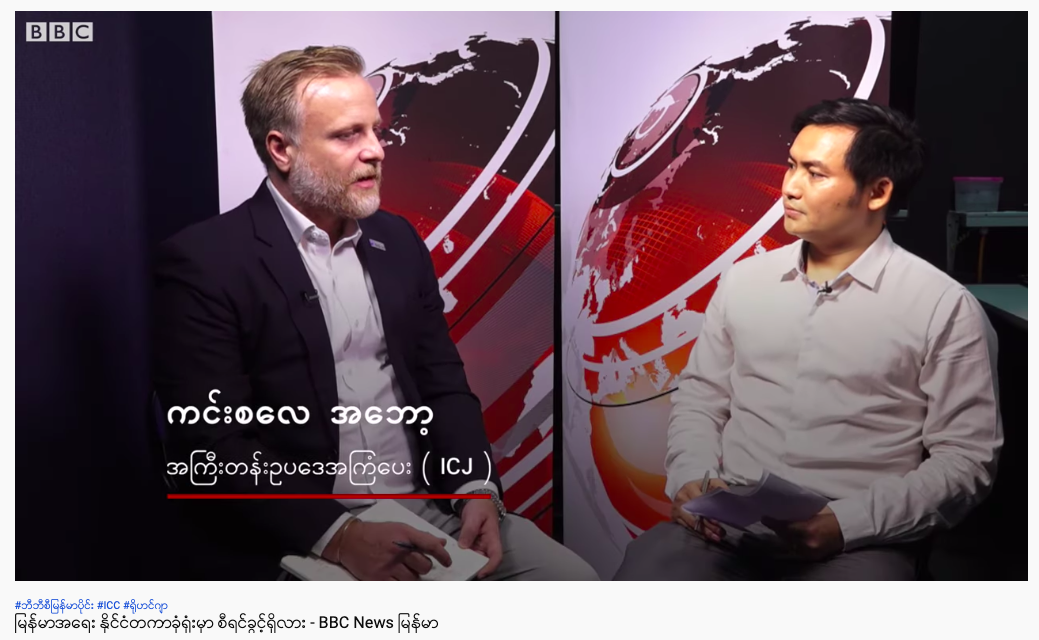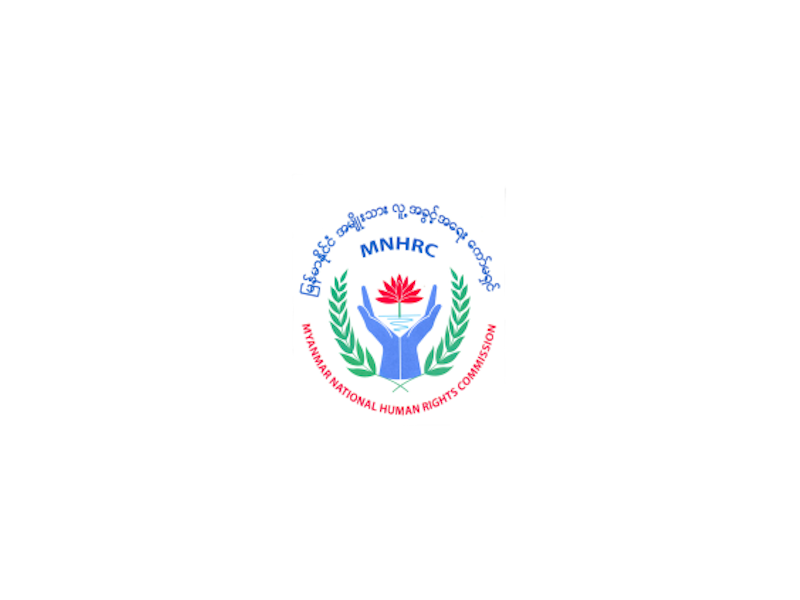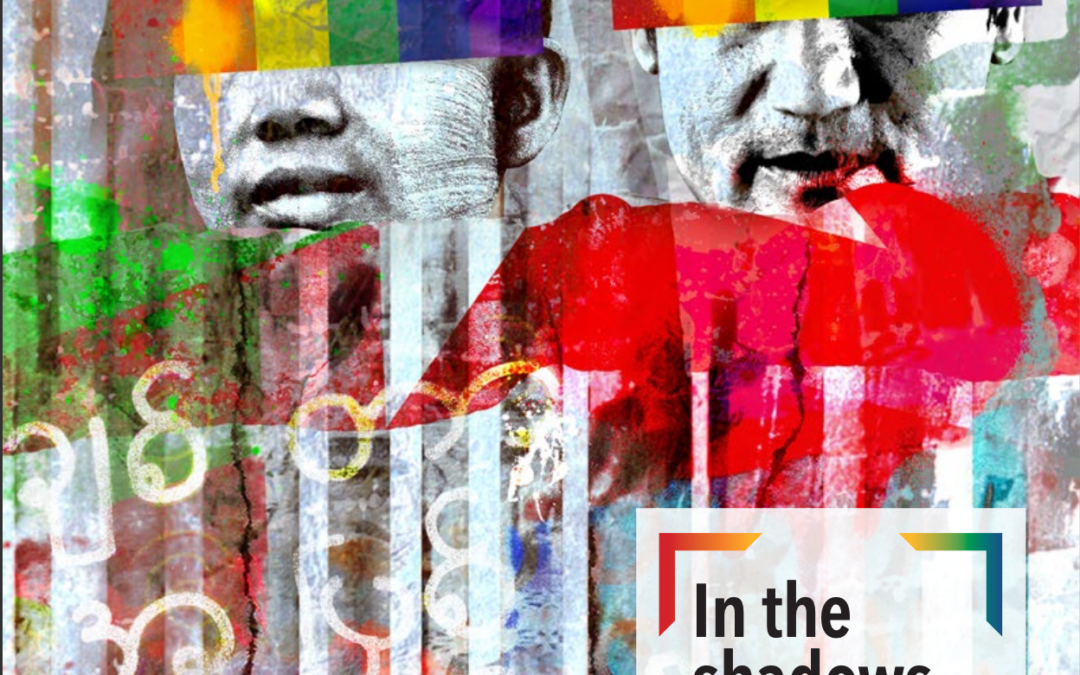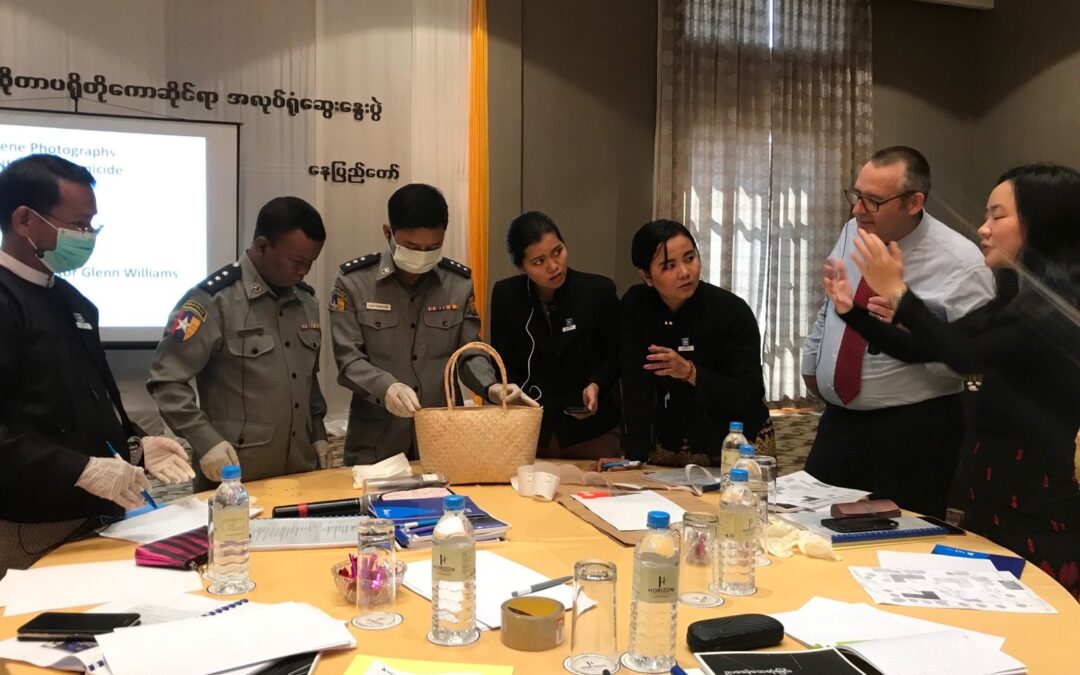
Nov 13, 2019 | Advocacy, Multimedia items, Video clips
In a video interview with the BBC’s Burmese broadcasting service, ICJ senior legal adviser Kingsley Abbott explains to the Myanmar public how the International Criminal Court prosecutor plans to investigate the crime against humanity of deportation from Myanmar to Bangladesh, which has affected around one million Rohingya.
Recorded on 24 August and published on 12 November 2019. The interview transcript is available in Burmese and English.
Contact
Kingsley Abbott, ICJ Senior Legal Adviser, e: kingsley.abbott(a)icj.org

Nov 12, 2019 | Advocacy, News
The Government of Myanmar should adopt constitutional and legislative guarantees to enable the Myanmar National Human Rights Commission (MNHRC) to better protect and promote human rights for all persons in the country, according to a new ICJ briefing note.
Entitled Four Immediately Implementable Reforms to Enhance Myanmar’s National Human Rights Commission, the note analyzes the ability of the MNHRC to address various human rights violations, some of which have been found by experts to constitute the most serious crimes under international law. The briefing is available in Burmese and English.
“The NLD-led government should promptly reform the MNHRC Law, allowing for the selection of better qualified and representative Commissioners, and granting them the independence and resources necessary for their work. This reform is a low-hanging fruit for the NLD, and overdue” said Sean Bain, ICJ Legal Adviser.
“At the same time, Commissioners should robustly pursue their mandate, including by advocating for the rights of society’s most vulnerable people,” he added.
The MNHRC itself has recognized the need for law reform, in its self-assessment of 2018, and in its reform proposals to the Government. Any law reform process should be opened up to genuine public consultation, enabling inputs from experts and the general public.
“The MNHRC generally fails to act on reported human rights violations, from crimes by soldiers in border areas through to regular attacks on the press, rendering it ineffective in providing redress to victims,” said Sean Bain, ICJ Legal Adviser. “The MNHRC’s routine inaction in critical cases demonstrates its lack of the necessary independence to stand against state actors, particularly the military,” he added.
One illustrative case is the Commission’s reluctance to further pursue justice for the death in military custody of journalist Ko Par Gyi, whose killers were secretly tried and acquitted in a military court, despite the MNHRC’s finding that a public criminal prosecution was warranted. Commissioners have also been notably silent on gross human rights violations against Rohingyas, perpetrated by Tatmadaw soldiers in the context of “clearance operations”.
The note highlights that the Commission refrains from investigating alleged human rights violations by referencing Section 37 of the 2014 MNHRC Law. This provision is narrowly construed to effectively preclude the MNHRC from conducting inquiries on matters that are already the subject of a legal proceeding.
The composition of the Commission also does not reflect Myanmar’s ethnic, religious, regional and gender diversity, which further erodes its ability to address the conflict-related violations and abuses particularly prevalent in border areas such as Rakhine, Kachin and Shan states.
While amending problematic provisions in the 2014 MNHRC Law is warranted, a constitutional guarantee would also significantly improve the Commission’s institutional independence.
“A constitutional provision, in contrast to ordinary legislation, is subject to a stricter amendment process that would less likely render the MNHRC politically vulnerable,” said Jenny Domino, ICJ Associate Legal Adviser.
“Myanmar can look to the experience of the national human rights institutions of East Timor and the Philippines, which were established by constitutional provision at a time that both countries were transitioning to a democratic and rule of law based order”,” she added.
Four immediately implementable reforms for the Government of Myanmar are recommended:
- To the Union President and the Selection Board: appoint Commissioners through a transparent and fully consultative process that enables its composition to effectively protect human rights and appropriately reflect the full diversity of the population of Myanmar, including ethnic, religious, regional, gender and sexual identities;
- To the Commissioners: adopt a broad and active interpretation of their mandate, including by taking steps to address the most serious violations, including crimes under international law, and certain human rights cases that have gone before courts;
- To the Myanmar parliament: amend the 2014 MNHRC Law to include provisions that strengthen the MNHRC’s capacity and independence, and improve the appointment process for commissioners
- To the Constitutional Amendment Committee: propose provisions guaranteeing the structural and financial independence of the MNHRC in amending the 2008 Constitution.
To download the press release in Burmese, click here.
Download
Myanmar-MNHRC-Advocacy-Briefing-Note-2019-ENG (in English, PDF)
Myanmar-MNHRC-Advocacy-Briefing-Note-2019-BUR (in Burmese, PDF)
Contact
Jen Domino, ICJ Associate Legal Adviser, e: jenny.domino(a)icj.org, t: 09968134317
Daw Hnin Win Aung, ICJ Legal Adviser, e: hninwin.aung(a)icj.org, t: 09428122794
Related material:
Achieving Justice for Gross Human Rights Violations in Myanmar: Baseline Study
Myanmar: Five years without justice for journalist Ko Par Gyi

Nov 8, 2019 | Advocacy
Myanmar’s criminal laws are outdated and fail to respect and protect human rights, especially the rights of LGBTQ people and rights enshrined in binding international human rights treaties. This is the key finding of the new report ‘In the Shadows: Systemic Injustice Based on Sexual Orientation and Identity/Expression in Myanmar’.
The Denmark-Myanmar Programme on Rule of Law and Human Rights, implemented by the ICJ in partnership with Danish Institute for Human Rights commissioned this report. The report team was made up of ICJ staff who are part of the Denmark Myanmar Programme. Legal review was also provided by advisers from the ICJ team. The report is endorsed by three leading local LGBTQ and human rights organizations and one network : LGBT Rights Network, Colors Rainbow, Kings N Queens, and Equality Myanmar.
The report highlights emblematic cases and recurring human rights violations against LGBTQ people in Myanmar. Research for the report included interviews with 70 respondents from across several states to ascertain their experiences and impressions of the criminal justice system. All testimonies are anonymous and all identities are pseudonyms.
The report highlights the outdated laws that continue to affect the lives of LGBTQ people, including Section 377 of the Penal Code which criminalizes consensual same-sex conduct. Even though not commonly enforced, the fact that this law remains in place since the colonial era legitimizes prejudice, discrimination and extortion against LGBTQ people. India’s Supreme Court decided only last year that criminalization of consensual same-sex relationships under Section 377 is a violation of the Indian Constitution and is in breach of India’s obligation under international law. That is the reason why Myanmar should follow this trend and repeal Section 377 as soon as possible or at least insofar it criminalizes same-sex relationships.
Other criminal provisions that play a large part in justifying abuse against LGBTQ people are the “Shadow Laws” or “Darkness Laws” – the colloquial name of colonial era legislation that can restrict citizens’ ability to be in public after dark without an accepted justification. These provisions – from which the report’s title is drawn – are primary examples of criminal laws that are misused against LGBTQ people and result in ongoing stigmatization, human rights violations and overall injustice. Some of their provisions are vague and overbroad and are therefore open to serious abuse. Law enforcement officials too easily invoke these provisions to harass, threaten, detain and even bring spurious charges against LGBTQ people. Research from the report documents how these criminal laws have been used to enter LGBTQ people’s homes, accuse them of ‘committing unnatural sex’, take them into police custody, and to subject them to abuse.
This report further details the discriminatory attitudes of law enforcement officers, which contribute to LGBTQ people being targeted and subjected to unjust and unfair treatment within the criminal justice system. The mistreatment takes many forms, from arbitrary accusations and ensuing detentions, physical, sexual and verbal assaults, and coerced concealment of sexual orientation and gender identity/expression. Given the biased, discriminatory and at times violent behavior towards them, LGBTQ people have come to mistrust law enforcement agencies and avoid the justice system wherever possible.
‘In the Shadows’ identifies the problematic attitudes of certain key players in Myanmar’s criminal justice system with respect to Sexual Orientation, Gender Identity/Expression issues. Core concerns include the discriminatory treatment and the barriers to justice LGBTQ people face, from their role in public life, or as a detainee, witness or suspect in court.
The report concludes with a set of recommendations that seek to make existing law and policy more protective of LGBTQ peoples’ rights. This includes the repeal of Section 377 of the Penal Code, at least insofar as it criminalizes consensual same-sex sexual conduct, the reform of the ‘Shadow Laws’, and cessation of all discriminatory arrests and detentions.
Human rights and LGBTQ rights activist and contributor to the report, U Aung Myo Min, sums up the importance of ‘In the Shadows’: “The stories in this report highlight the suffering, intimidation, and threats faced by LGBTIQ in Myanmar today. These injustices must be stopped, and we all have a moral imperative to be part of the solution.”
We are committed to working with main stakeholders in the country, such as the Parliament, the Police, GAD, actors of the legal system and the Myanmar National Human Rights Commission. We are willing and prepared to provide full support, expertise and advice to the Myanmar Parliament in pursuit of the repeal of Section 377 of the Penal Code, the provision for ‘unnatural at least insofar as it criminalizes consensual same-sex sexual conduct, to enact anti-discrimination legislation in Myanmar, to become a party to nine core international human rights treaties, to establish legal gender recognition for transgender persons, to reform vague and discriminatory laws.
This statement is endorsed by: LGBT Rights Network, Colors Rainbow, Kings N Queens and Equality Myanmar.
Report
Download In the Shadows: Systemic Injustice Based on Sexual Orientation and Identity/Expression in Myanmar in English.

Oct 30, 2019 | News
The ICJ hosted a two-day workshop on 28-29 October 2019 in Myanmar’s capital, Nay Pyi Taw. Organized jointly with the Union Attorney General’s Office (UAGO), 15 prosecutors and ten members of the Myanmar Police Force attended this event, entitled “Workshop on the Minnesota Protocol.”
Participants included persons involved in the conduct of criminal investigations, as well as senior members with oversight of their work. The workshop was opened with remarks by His Excellency U Win Myint, Deputy Attorney General of the UAGO, and Sean Bain, Legal Adviser for the ICJ in Myanmar. Both speakers underscored the importance of conducting effective investigations according to international standards.
The Minnesota Protocol provides guidance on the State’s implementation of its duty under international law to effectively, thoroughly and impartially investigate potentially unlawful killings, including when State actors may have been involved. It applies to deaths under custody, suspicious deaths, and suspected cases of enforced disappearance. The workshop takes place in a context in which Myanmar has experienced well documented and widespread incidences of such unlawful killings amounting to serious crimes under international law.
An overview of the international human rights law framework was provided by ICJ Associate Legal Adviser Jenny Domino, highlighting how the conduct of prompt, effective and impartial investigations into unlawful killings is a core component of the State’s obligation to uphold the right to life, binding on all States under international law. ICJ Legal Researcher Ja Seng Ing provided an overview of the contents of the Minnesota Protocol, including a discussion of its 2016 revision to align it with contemporary norms and practices.
Glenn Williams, an experienced international criminal investigator and Detective Inspector (Retired) of the New Zealand Police Force explained how to properly secure a crime scene and chain of custody in order to preserve the integrity of the evidence. Participants applied these skills in a group exercise based on a real-life case from the Solomon Islands. He also presented on the proper conduct of witness interviews, emphasizing the need to frame questions in a manner that would avoid the re-traumatization of victims. Glenn Williams further shared the investigative challenges of dealing with telecommunications evidence from his time at the Special Tribunal for Lebanon.
Dr. Porntip Rojanasunan, a forensic pathologist in Thailand and Member of the Expert Advisory Panel during the Minnesota Protocol revision process, shared her forensic expertise through illustrative cases that she had worked on in Southeast Asia in the past two decades. Dr Porntip stressed the importance of forensic pathology in determining the true cause of death. She also emphasized the importance of conducting an autopsy in potential cases of human rights violations.
The workshop is part of the ICJ’s ongoing promotion of international human rights law and standards globally. In Asia, this has included engagement with Myanmar authorities as well as authorities in neighboring countries.
See also:
Myanmar: ICJ discusses the Minnesota Protocol with prosecutors
ICJ Oral statement in the interactive dialogue with the fact finding mission on Myanmar
Report: Achieving Justice for Gross Human Rights Violations in Myanmar
Related material:
Minnesota Protocol (English)
Minnesota Protocol (unofficial Burmese translation)

Oct 21, 2019 | News
A new briefing paper by the ICJ calls upon Myanmar authorities to ensure that the right to freedom of thought, conscience, religion or belief and respect for culture and tradition are never used as pretexts to justify discrimination and violence in the country.
“The analysis in the ICJ’s paper makes clear why there is a pressing need for Myanmar authorities to undertake significant legal and practical reforms, to ensure that all people can exercise their freedom of religion and belief and enjoy equal protection of their human rights,” said Frederick Rawski, Asia Pacific Region Director for the ICJ.
The paper focuses its analysis on two particular sets of laws – the colonial era ‘blasphemy’ laws, which in recent years have also been used as one of the several measures to restrict free speech and the controversial ‘race and religions laws’ passed in the run up to the national elections in 2015, particularly those related to religious conversion and marriage of Buddhist women.
“The briefing paper highlights a number of laws in Myanmar that impair the enjoyment of the right to freedom of religion or belief’’, said Canadian Member of Parliament David Anderson, Chair of the International Panel of Parliamentarians for Freedom of Religion or Belief Steering Committee, which supported production of the paper.
In recent years, Myanmar courts have convicted individuals under ‘blasphemy’ provisions even in the absence of any evidence of deliberate and malicious intent to insult a religion, let alone on the basis of irrefutable evidence of incitement to violence, hostility or discrimination on religious grounds.
In addition to the use of colonial-era blasphemy laws, Myanmar has a more recent set of four laws that appear to specifically target non-Buddhists, and particularly the Muslim community. While all four laws give rise to concerns about the right to freedom of thought, conscience, religion or belief, the laws related to conversion and marriage are the most problematic.
The briefing paper also identifies a number of other challenges related to the protection and promotion of the right to freedom of religion or belief in Myanmar. These include:
- Highly discriminatory legal arrangements for citizenship and the rights of residents in Myanmar;
- Arbitrary restrictions on places of worship, mostly for Christians and Muslims;
- Preferential treatment of Buddhism, for example in the national school curriculum.
In light of these challenges, the briefing paper offers 11 key recommendations to the Government of Myanmar in ensuring that Myanmar’s legal framework is implemented in accordance with international human rights law and fully protects the right to freedom of religion or belief.
This report is part of a series of ICJ publications on the right to freedom of religion or belief.
Contact
Frederick Rawski, Asia Pacific Director for the ICJ, frederick.rawski(a)icj.org
Liv H. Kvanvig, Coordinator, IPPFoRB, lk(a)nhc.no
Palak Rao, Communications and Advocacy Adviser, IPPFoRB, pr(a)nhc.no
Download
New Briefing paper on Challenges to Freedom of Religion or Belief in Myanmar
See also
New primer on Freedom of Religion or Belief in International Human Rights Law
New Briefing paper on Challenges to Freedom of Religion or Belief in Malaysia









